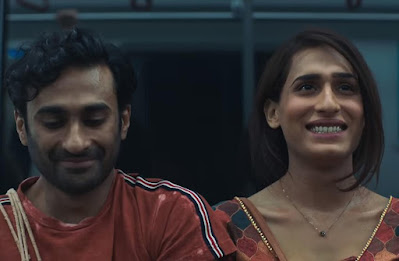That this tangle proves supremely absorbing is down in large part to the richness of the worlds Sadiq and co-writer Maggie Briggs describe. There is Lahore's erotic cabaret scene, for starters: tamer than any Western equivalent, reliant on suggestive lyrics and gyration rather than rampant flesh-flaunting, but every bit as jostling with salty characters and big personalities. For Haider, it's an escape from an oppressive norm, a chance to unwind; Sadiq has affectionate fun watching this squarish straight-edge trying his utmost to fit in. (His dancing needs, uh, some work.) The romance between Haider and Biba, sincere and true, progresses from fascination via allyship to something deeper still, without a wayward script beat or false emotional note. And yet Joyland never completely loses sight of what's waiting for - and who's missing Haider - back at the family ranch. Yes, it's the stern father, who finds it shameful enough that his boy should have left a cardboard promotional cutout of Biba on the roof overnight for all the world to see. (Not for the first or the last time in the film, Biba towers above everyone.) But it's also Haider's loving wife Mumtaz (Rasti Farooq), growing understandably frustrated at being left behind to cook, clean and look after the kids, and increasingly aware she's carrying around within her the growing agglomeration of cells that will lock her down only further. Sadiq's boxy frames - which the Lebanese cinematographer Joe Saade sometimes pushes gradually into, like a pressure on the chest - heighten our sense that everyone really needs room to move and breathe; even the father, old, infirm and horribly lonely, winds up wetting himself after jamming his wheelchair in a corridor on the way to the bathroom. It's no way to live.
There is life here, all the same, and the great force of Sadiq's film lies in its keen-eyed pursuit of pleasure; that title is far from wholly ironic. Admittedly, it remains a realist's idea of pleasure: the cabaret's opening night, which might have yielded a lavish, Bollywood-like setpiece, instead begins with the performers having to negotiate a blackout, and ends with a sweaty close-up, emphasising the strain of performance. But each of the main characters is yearning, longing or aching for something, whether or not they get close to it. Sadiq's most radical idea - doubly so within the generally coy context of South Asian cinema - is to reach for lust as a great leveller. He makes these characters properly hot to trot, even as he then notes their horniness isn't likely to be alleviated by sleeping three, four or five to a bed with their own oblivious offspring. (How those children were conceived in the first place is one of the film's mysteries. If it holds anything so obvious as a moral, Joyland's would be take your pleasures where you can, especially in societies set up to reward sacrifice and separate the sexes.) These characters spring to life as recognisable flesh-and-blood, at once frisky, frustrated and fragile; they're played with an uncommon sensitivity by these largely unknown performers, such that you know from a very early juncture that their dilemmas and decisions are going to linger in the mind long after the closing credits have rolled. Junejo is touchingly puppyish in his pursuit of warmth and softness, and if we come to share his predicament, it's because we, too, wouldn't want to have to choose between the very different women of the piece. Sadiq doesn't, either, which results in an arguably too open ending. Yet after two hours of carefully maintained and observed containment, this is understandable, and there's something characteristically buoying about the way Joyland circles back to a treasured memory of happier times. Even in the wake of tragedy, this camera - and the profoundly promising filmmaker stationed behind it - resumes the hunt for consoling moments of tenderness.
Joyland is now playing in selected cinemas.

No comments:
Post a Comment